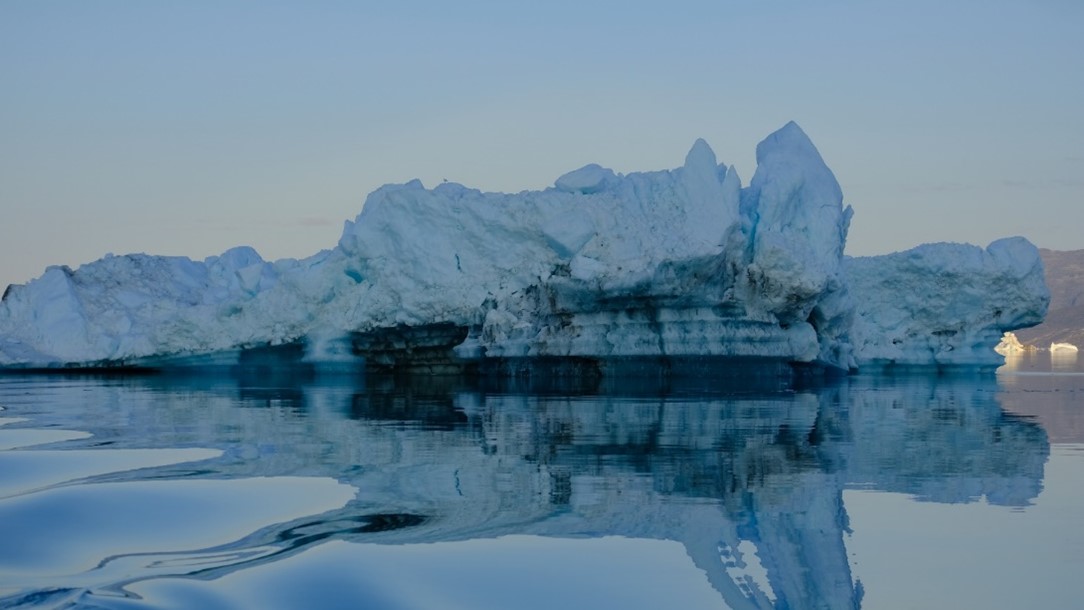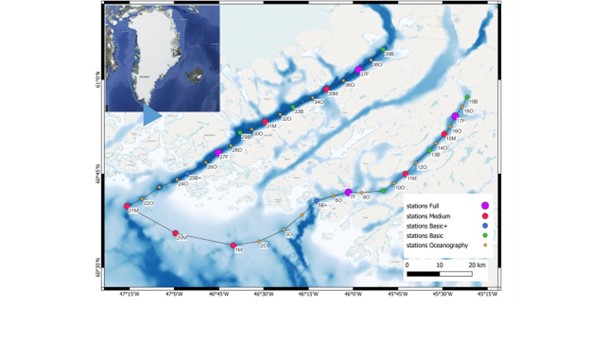The Belgica Documents Climate Change in an Arctic Marine Ecosystem
On the 13th of July 2023 the new Belgian oceanographic research vessel RV Belgica is leaving from Reykjavik, Iceland, for a trip of three weeks to southwest Greenland. The international research team on board will make use of the advanced facilities on board of the ship to investigate how climate change, and more specifically changes in glacial melt, will affect the carbon dynamics, biological communities and food webs in Greenlandic fjords, a typical Arctic marine ecosystem.
Fjords are systems of regional and global importance by supporting highly productive and diverse food webs. As this rich marine life stores a lot of carbon, the fjords play a far more important role as CO2 sinks than one would suspect based on their limited size relative to the vast ocean basin.
From Marine- to Land-terminating Glaciers
These days, global warming significantly impacts fjord systems through the accelerated melting of ice, with the greatest impact in polar areas such as Greenland. Here, coastal glaciers often terminate in the fjord, so called marine-terminating glaciers.
However, especially at Greenland’s marine-terminating glaciers draining 88 % of the ice sheet in the study area, discharge has recently increased sharply caused by increased melting of the ice sheet. As a consequence, many of Greenland’s marine-terminating glaciers are gradually shifting to land-terminating glaciers, a process which will likely intensify in the near future.

Impact on Ecosystem Functioning and Services
Whereas there is increasing evidence that shifts in glacier types cause major changes in the physical, biogeochemical and ecological processes in the associated fjord systems, the consequences for the marine food web and carbon burial in sediments are currently not fully understood. As a result, the impacts of further warming on ecosystem services provided by Arctic fjords (e.g. food provisioning, climate regulation) remain unknown.
This Belgica expedition aims to investigate to what extent changing glacial melts in Arctic fjords may lead to lower primary productivity and a less rich food web. The research is part of the CANOE project (Climate chANge impacts on carbon cycling and fOod wEbs in Arctic Fjords), which is funded by the Federal Science Policy Office (BELSPO).
Study Area
The study area consists of two adjacent fjords with contrasting glacier input, respectively marine- and land-terminating. In both fjords, a gradient from shelf to inner fjord will be sampled. Oceanography and pelagic (water column) biogeochemistry will be described at high resolution in each fjord (oceanographic stations), in addition to the benthic (seafloor) biogeochemistry and biodiversity (basic and medium stations), while the food web will be described and quantified at two contrasting locations in each fjord (full stations).

“With this expedition the team will contribute to major societal concerns for which research-based management strategies are crucial for the future” says Ann Vanreusel, professor at the Department of Biology of Ghent University and chief scientist of the RV Belgica Greenland expedition. “By providing insights into expected climate change effects on coastal marine food webs, important information for a future ecosystem-based management in the Arctic fjords is generated.”
The CANOE project, coordinated by prof. Ulrike Braeckman (RBINS and UGent), will also construct predictive models that will help to anticipate the ongoing and future climate-related shifts in marine ecosystems and the consequences for natural resources and other ecosystem functions such as CO2 mitigation.
The Tradition of Integrated Research
Belgium has a long tradition in marine Arctic research since Adrien de Gerlache set sail with the historical Belgica in 1907 for a scientific expedition exploring parts of the Arctic Ocean. Even at that time, this involved integrating many research disciplines into the expedition, and involving scientists of different nationalities. In the spirit of this tradition, the CANOE-scientists now also use the new RV Belgica for an integrated and international research campaign, linking physical, biogeochemical and biological aspects of the water column with seafloor processes in Greenlandic fjord ecosystems with glacier dynamics under influence of climate change. Such an interdisciplinary campaign requires optimal use of the numerous oceanographic and biological research instruments offered by the RV Belgica.
The multidisciplinary international CANOE team is led by researchers from Ghent University (UGent) (Prof. Ulrike Braeckman) and also consists of researchers from the Royal Belgian Institute of Natural sciences (RBINS), Flanders Marine Institute (VLIZ), University of Antwerp (UAntwerp), Royal Netherlands Institute for Sea Research (NIOZ), University of Southern Denmark (SDU) and University of Bonn (Germany). The research is also carried out in association with Greenland research institutes.
CANOE is funded by the Belgian Science Policy Office (BELSPO) as beneficiary of a specific call that was designed to give an impulsion to the start-up of research on the new RV Belgica and to allow researchers to get to know the ship and her potential. The project runs from 15 December 2021 to 15 March 2026. For more information of the project please visit http://canoe.marinetraining.eu/.
The CANOE expedition with RV Belgica follows the DEHEAT expedition that operated in Icelandic waters from 26 June to 11 July. Here, it investigated how the natural weathering of silicate minerals in the sea consumes the greenhouse gas carbon dioxide from the atmosphere, thereby helping to remove it from the atmosphere, and when accelerated could be an ally in the fight against global warming.
More information on RV Belgica can be consulted at the ship’s websites at RBINS (including live position information and webcam images) and BELSPO. The ship and its scientific activities can also be followed on Facebook and Twitter.
